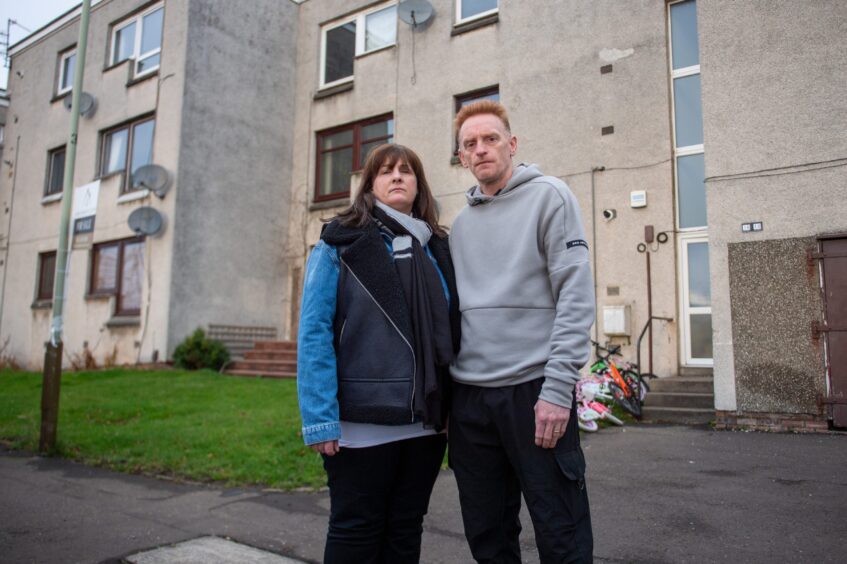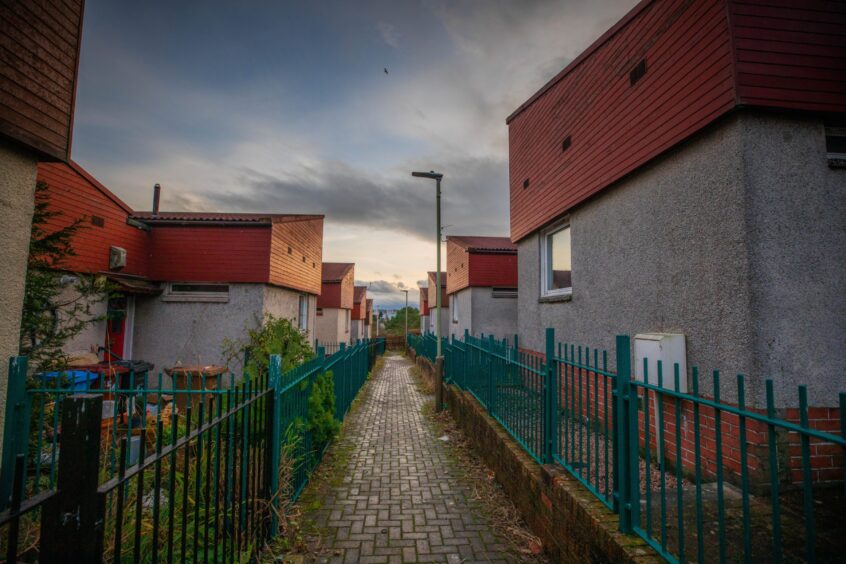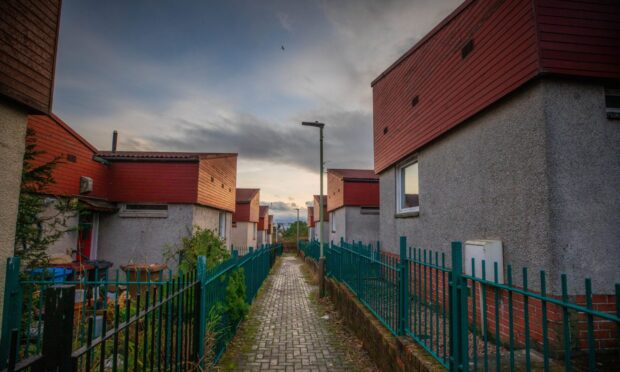Dundee Raac campaigners say residents fear their homes could be demolished due to the potentially dangerous concrete.
Reinforced autoclaved aerated concrete (Raac) is a lightweight form of concrete used in buildings from the 1950s until the 1990s.
The decay-prone concrete has been found in hundreds of homes across Dundee, many of which were bought from the council as part of the ‘Right to Buy’ scheme.
The local authority says it has no ongoing maintenance responsibilities for these properties, with homeowners left to deal with inspection and repair costs themselves.
Dundee couple leading Raac campaign group after Raac discovery in flat
Husband and wife Wayne and Yvette Hoskins have been leading the Dundee Raac Campaign Group since discovering the roof of their flat block contained the concrete.
Yvette has spoken to scores of other residents in the past two months.
She says people are worried the buildings could be demolished, as has been the case for hundreds of homeowners and council tenants in Aberdeen.
Yvette told The Courier: “We have been around different areas all over Dundee and people – homeowners and council tenants – just want to know that they are not going to be made homeless.
“The council hasn’t said they will demolish homes, but they were saying that in Aberdeen a year before people were told they needed to leave their homes.
“A lot of these people don’t have support and we want to offer it so they don’t feel alone.
“We are finding a varied group of people are affected.
‘People are really worried that they are going to lose their homes’
“I have been going to meet with people to sit and have a conversation with them about Raac.
“Demolition is what most people are worried about.
“We have some families that have lived in their homes for a few years or others who have lived there since they were children and have spent all their money on the house.
“People are really worried that they are going to lose their homes or part of their estate when they are no longer here.
“We have a voice to support anyone affected.
“As soon as any local authority decides they are going to demolish there is not much we can do about it.
“These people in Aberdeen were told their homes were satisfactory.
“Dundee is doing the same.
“I am not saying Dundee is going to demolish buildings, I can’t preempt that, but they obviously have no budget to replace the Raac.
“If they repair it that will prolong it but that doesn’t fix the problem.”
Yvette and Wayne are being supported by Wilson Chowdhry, who is campaigning for Raac-affected homeowners across the country.
They are urging residents to sign a petition urging the Scottish Government to provide support to communities affected.
The couple have been unable to sell their own home on Southampton Place after Raac was found in the building.
Buyers unable to get mortgage
Potential buyers have pulled out after struggling to secure a mortgage.
Wayne says the flat also failed to sell at auction after they were offered just £20,000 – leaving a £30,000 loss.
He plans to keep the property on the market “until it has run its course”.
Wayne and Yvette plan to visit homes in Menzieshill, Ardler and Dryburgh with leaflets this month.
Wayne added: “There is still a lot of work to be done and we are continuing to try to make people aware of our petitions, that is the most important thing people can do.
“We need to have a voice in parliament and want the Raac to be replaced with solid concrete.”
The Dundee Raac Campaign Group also claims there are homes across the city with Raac yet to be disclosed.
However, the local authority says it is “satisfied” all affected properties have been identified.
The group will hold a protest in the City Square from 11am until 12pm on Saturday January 11, followed by a meeting at Downfield Mains Church from 1pm.
Council ‘satisfied’ all Raac-affected properties identified in Dundee
Dundee City Council refused to say whether homes with Raac could be demolished when asked by The Courier.
A spokesperson said: “We are satisfied that all affected properties in the city have been identified.
“Those properties that are affected will continue to be inspected as per the recommendation of the Institute of Structural Engineers.
“Where properties are privately owned, responsibility for maintenance lies with owners who are recommended to seek their own advice regarding the condition of Raac present within their property.
“The council cannot give legal advice to owners so owners may wish to consult their own solicitors.”
The Courier has spoken to several residents affected by the potentially dangerous concrete, including a mum who fears the roof of her Whitfield home could fall on her toddler daughter in the middle of the night.
Meanwhile, West Ferry couple Hazel and Derek Boyle say their retirement plans have been “ruined” after Raac was also found in the roof of their flat.














Conversation